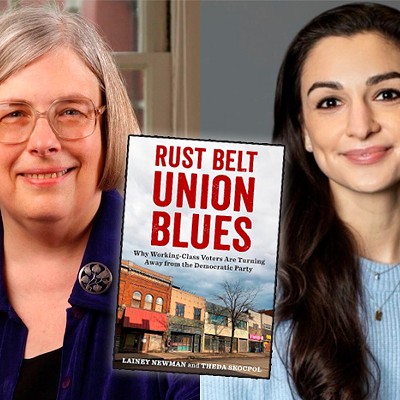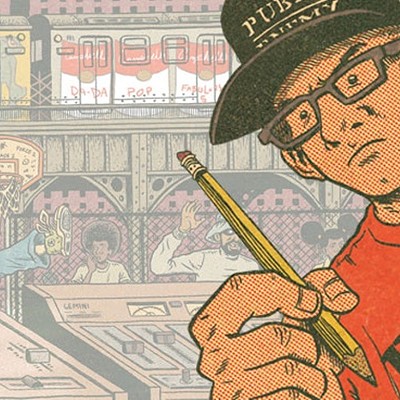This is the first installment in Dan Arp's four-part short story, "Barrel Man." A Texas native, Arp has been teaching fiction in the Pittsburgh school district for the past six years. Arp says he wrote "Barrel Man" because the story's protagonist "kept telling me he was cold in Pittsburgh, and something else told me to send him to Hell, which for me is the rodeo in Houston."
Winter had beaten him. Leonard had come into it unprepared: crummy pajamas, an apartment with poor heating, and no blanket. It was getting on March when he decided to buy one. In the mornings after tense sleeps interrupted by his mother's phone calls, he awoke feeling like a corpse on a cooling board: The stitches on his sheets felt granular and prickly, like unfinished wood. All he had was a summer blanket, bought by his mother, in faded southwestern pastels. He wanted a smooth warm blanket. One night, he dreamt he had it, but it hovered a few inches above him; he couldn't pull it down.
He got the call in his office at the Human Computer Interaction Institute at Carnegie Mellon, where humans interacted only with their computers. Leonard answered phones and left messages for foggy professors, daydreamed about sex with burly men he would never meet, and shopped online for blankets. Sometimes he talked to Sarah, his dance teacher, on the phone, and she was the first person to cross his mind when his mother called him one afternoon, sounding more like herself than she had in years: "Come home. We'll meet your dad at the rodeo."
The rodeo? He didn't say yes right away. It had only been two months since the last visit, the worst yet. His mother had split from his father, lost her job at Macy's and downed a bottle of pills. She had called Leonard, telling him, "You've got 20 minutes."
He called an ambulance and then her psychiatrist, Dr. Majkovich, who told him, "She only wants the attention. She is alcoholic, and if anything, dying would keep her from drinking."
Against Dr. Majkovich's advice, Leonard had bought a ticket down.
He spent most of his time in the ICU waiting room. His father, who was busy with sweeps week at KHRV, his television station, came and went as he could.
A doctor updated Leonard on the size of his mother's ankles. The first day, they were grapefruits. The next day, oranges.
"I want to see her," Leonard said.
The doctor said, "See her now. But careful: She's sleeping."
It was nighttime. His mother was in bed, lit like a museum piece by a fluorescent lamp. In the dark window to his left, Leonard caught his reflection: face like hung wet clothes, shock of blonde hair poofing in front, the brown leather jacket his mother had given him last Christmas looking rumpled. He sat in a plastic chair and stared at her, at her high Indian cheekbones, at the wrinkled puddles of flesh above her knuckles, and at her otherwise youthful slender fingers. She was so still he thought she might be made of wood. Then there were her feet, swollen at the ankle beneath the sheets. Leonard thought of a pair of burrowing raccoons. And he thought again of his blanket, hovering in space above him. And he obeyed the doctor: He didn't say a word.
They had not spoken about the incident since. It had sent Leonard back to Pittsburgh and his mother back to her native suburb of Houston, where pills and therapy awaited them both. He'd just begun to feel real again -- going to weekly therapy sessions and obsessively attending his dance class out in Wexford -- when she called about the rodeo.
Immediately he thought of Sarah, his dance teacher. What could he tell her, or his mother? That he didn't want to fly home, that he didn't want a relationship, that he wanted men despite the fierce bout of flirting he'd had over the past month with Sarah, that he could never go home, that all he wanted, really, was a blanket, something to cover him and keep him from seeing, from feeling the winter he felt enclosing him?
"Let me think a day -- a week," Leonard said.
"A day," his mother said. "My tickets are for the 14th. I'm not going to go all nutty. I'm over that stuff. I just want to see some tough men in tight jeans, and I want the company of my husband and son."
"I don't like country music."
"You like men in tight jeans," his mother said.
He hesitated; this was not the type of call Leonard had come to expect from his mother. The call usually came late at night, say 3 a.m. There would be a moment of silence after he said "Hello," as though his mother hadn't heard him. And then that word: "Leonard?" in a tone as if to ask, "Why the hell did you answer the phone?" It was a question he wanted to ask himself as he endured the seconds of silence, a silence and darkness he filled with images of his mother's wrists emptying onto the concrete floor.
What a drunk, what a silent empty vessel of regrets, what a crazy and terrified and suffering animal. But Leonard was a frightened animal himself, running back home every other weekend to check on her and send her to new specialists, accommodate her with new pills and therapies. He was like a yo-yo at the end of a string, his mother the finger that sent it snapping back upon its origins, all that unraveled cord -- false progress -- recoiling into the groove as though it had never been stretched.
Yet he did it all, certain he was responsible for the breakdown. His mother had grown up under difficult circumstances, he had told his therapist, who only frowned. She had lost her mother at a young age, she had been sickly, she had never gone to college, something was taken from her the moment Leonard was born. She shook in terror the first few days of Leonard's life, certain she could not take care of him. When she came around she took care of him voraciously, with an appetite for caring that could not be suppressed. She lived for him until he grew up, and then she lived for furniture and alcohol, for spotless carpets, order, preservation. She became curator of a museum of her pasts, offering up clean spaces for viewing and remembering, until she couldn't take it anymore and needed the ugly taste of dirt in her mouth, needed sweat and pain, needed her son -- Christ, she said it all the time -- needed her son there to share this.
There were regrets to face, punishments to mete out, for both of them. And today, perhaps, his mother was merely laying the trap, modulating her voice for the brief minutes of a phone call, all to lure him back again.
"Two days," Leonard said. "We'll compromise."
He hung up on her (he'd gotten used to this), then immediately picked up the phone again, holding it mid-air between his ear and the receiver. He hadn't called Sarah since last weekend. Who knew if she wanted to talk to him? He wasn't even sure he wanted to talk to her.
He had no faith in anything anymore, wandered hallways and streets with a face like a hung jury, all that deliberation and self-appraisal culminating in a shrug and a nap. His mother's troubles had been going on for a year, and it was only four months ago that a child-like panic had seized him in Barnes & Noble; he had found the ad in the local weekly: "So you want to dance?"
He couldn't stand to take a class in the city -- he was too ashamed -- so he made the 40-minute drive to Wexford, its strip malls providing a blanket of bland anonymity. There, at a wide-open second-floor studio, he'd taken his first dance steps -- the rumba box -- across a waxed parquet floor.
Leonard noticed right away the jagged beauty of Sarah's mouth, the tortured pastiness of her skin, the Cosmo make-up and clothing that covered her body like a shameful secret, and a sort of smallness and mean need behind the eyes. This picture of her, still as a photograph while she selected a cha-cha from a stack of minidiscs for their first lesson, was enough to slay him.
She started Leonard in practice hold -- clasping hands in front of the body -- and told him to walk toward her. He obeyed, shuffling hands-first across the mirrored, yellow room. "That's it, babe. If you can walk, you can dance."














